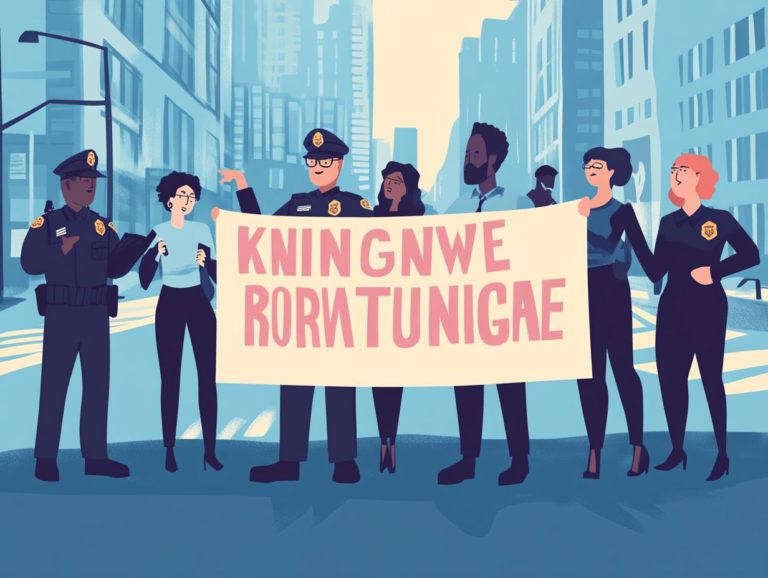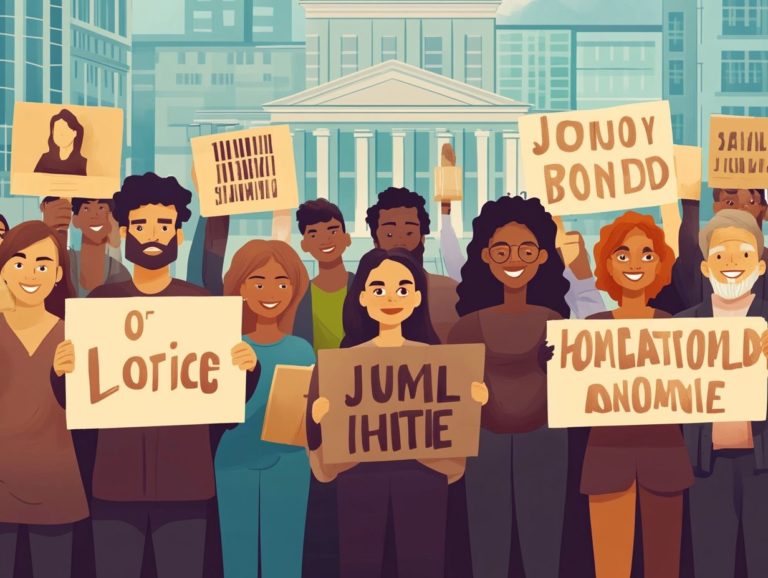What to Expect When Claiming Your Rights
Understanding your rights is crucial as you navigate a world brimming with complexities and challenges. This article delves into the essence of defining your rights and responsibilities, emphasizing the significance of empowerment and advocacy. You will also find valuable resources and organizations that can support you.
Arm yourself with knowledge to confidently stand up for your rights and create a meaningful impact.
Contents
- Key Takeaways:
- Understanding Your Rights
- The Importance of Claiming Your Rights
- Challenges in Claiming Your Rights
- Steps to Claiming Your Rights
- Resources for Claiming Your Rights
- Frequently Asked Questions
- What can I expect when claiming my rights for the first time?
- What are common obstacles when claiming my rights?
- How can I prepare for claiming my rights?
- What should I do if I face resistance when claiming my rights?
- What are my options if my rights are violated?
- How can I stay informed about my rights?
Key Takeaways:

Knowing and defining your rights and responsibilities is crucial for claiming your rights. Claiming your rights empowers you and allows for advocacy towards a better future. Identifying the issue and utilizing resources can help overcome challenges in claiming your rights.
Understanding Your Rights
Understanding your rights is essential for navigating the intricate landscape of employment and civil rights, particularly in the context of workplace dynamics. Employment rights encompass a range of legal protections aimed at guaranteeing fair treatment and respect within the workplace.
These include entitlements to paid leave, safeguards against breaches of employment contracts, and access to advocacy resources. Being aware of these rights is important, especially given the ever-evolving nature of laws and legislation, which are continually shaped by advocacy campaigns from organizations like Amnesty International and influential activists such as Malala Yousafzai and Greta Thunberg.
Defining Your Rights and Responsibilities
Defining your rights and responsibilities is crucial for effectively navigating the complexities of employment and civil rights. It ensures you have the legal backing necessary to advocate for yourself in the workplace.
As an employee, you possess specific rights, including the right to a safe work environment, fair wages, and protection from discrimination. These rights are deeply intertwined with broader human rights principles. These protections are fundamental to your dignity and reflect a society that values equality and justice.
Legal frameworks, including federal and state laws, govern these rights and outline the responsibilities of both employees and employers. Understanding these laws can be daunting, which is why seeking legal assistance is essential. Legal professionals can offer clarity, helping you fully comprehend your rights and ensuring you can navigate any potential conflicts with confidence.
The Importance of Claiming Your Rights
Claiming your rights is not just about you. It’s a bold step that fuels a movement for civil rights and social justice. When you stand up for your rights, you not only advocate for yourself but also cultivate strategies that can drive meaningful legislative changes, rally public support, and inspire collective action against injustices, both in the workplace and beyond.
This effort is essential in ensuring that rights like those championed by young activists such as Greta Thunberg and Malala Yousafzai are recognized and upheld throughout communities.
Empowerment and Advocacy

Empowerment and advocacy are deeply interconnected concepts that work together to address human rights abuses and promote social justice in diverse communities. When you understand your rights and cultivate the confidence to voice your concerns, a ripple effect unfolds, fostering an environment of active engagement.
Movements such as Black Lives Matter and the Women s March serve as prime examples of how grassroots organizing can mobilize individuals, driving significant policy changes and igniting national discourse around equality and justice. Community involvement is the backbone of these initiatives, allowing local voices to resonate powerfully.
Organizations like Amnesty International are vital, offering resources and historical context that enrich the conversation. Meanwhile, the U.S. Department of Justice can implement legal frameworks designed to protect marginalized groups, ensuring that advocacy translates into meaningful, tangible outcomes.
Challenges in Claiming Your Rights
Claiming your rights can come with a myriad of challenges and common hurdles. These may include a lack of understanding regarding employment rights and the fear of retaliation from employers or colleagues.
It’s crucial to acknowledge these barriers so you can navigate them effectively. The intricacies of legal processes, such as the Employment Tribunal or Small Claims Court, can feel overwhelming without the right legal guidance and awareness of your entitlements.
Common Obstacles and How to Overcome Them
Common obstacles in claiming your employment rights include insufficient evidence, fear of repercussions, and a lack of knowledge about the legal frameworks. These challenges can feel particularly overwhelming.
When you find yourself needing to gather crucial evidence, like text messages or recorded conversations, take actionable steps. Document all relevant interactions and keep any written communications organized.
Seeking guidance from organizations such as ACAS or HMRC can provide invaluable support. These organizations offer resources and advice tailored to employment rights, helping you understand your entitlements and the processes involved.
This knowledge gives you the power to pursue your claims with greater confidence.
Steps to Claiming Your Rights
To successfully claim your rights, you need a structured approach. Begin by fully understanding your rights, then effectively gather evidence.
After that, seek out the appropriate legal channels for resolution, whether that involves the Employment Tribunal or contacting HMRC.
This methodical process empowers you to navigate your situation with confidence and clarity.
Identifying the Issue and Taking Action

Identifying the issue is your first crucial step in claiming your rights. This step gives you the power to take decisive action and craft a clear strategy for advocacy and resolution.
Whether you’re dealing with unpaid wages, a breach of your employment contract, or unfair treatment in the workplace, finding the exact issue is essential.
Start by reviewing your pay stubs and employment agreements to gather evidence of any discrepancies. Next, draft a formal letter to your employer that clearly outlines your situation and references relevant documentation.
Utilizing templates available online can streamline this process. After sending your correspondence, keep a record of all communication and be prepared to escalate the issue if you don t receive a satisfactory response.
This approach addresses the situation and strengthens your position.
Resources for Claiming Your Rights
You have plenty of resources at your fingertips to claim your rights. Organizations and support systems are dedicated to providing legal assistance, expert advice, and effective advocacy strategies.
Organizations and Support Systems
Organizations and support systems are instrumental in helping you claim your rights. They provide invaluable resources and guidance for navigating the often complex legal landscape.
ACAS, the Advisory, Conciliation and Arbitration Service, offers essential information on your employment rights. They can assist in facilitating communication between you and your employer.
The Employment Tribunal is a legal body that helps resolve workplace disputes. It provides a formal avenue to address grievances and pursue compensation.
By engaging with these organizations, you gain the support necessary to fully understand your rights and prepare the required documentation.
Frequently Asked Questions
What can I expect when claiming my rights for the first time?

Claiming your rights for the first time can bring many emotions. You might feel fear, anxiety, or even empowerment.
It’s essential to educate yourself about your rights. Having a support system can help you through the process.
What are common obstacles when claiming my rights?
Common obstacles include not knowing your rights and fearing retaliation. It’s vital to seek guidance and understand your rights before acting.
How can I prepare for claiming my rights?
Start by learning about your specific rights and the laws that protect them. Gather evidence or documentation that supports your claim.
Also, create a plan to address any potential challenges.
What should I do if I face resistance when claiming my rights?
Stay calm and assertive if you encounter resistance. Seek help from a legal professional or an advocacy organization that protects rights.
Always document any instances of resistance for future reference.
What are my options if my rights are violated?
If your rights are violated, you have several options. You can file a complaint, seek legal action, or reach out to advocacy groups for support.
Knowing your options is crucial for choosing the best course of action.
How can I stay informed about my rights?
Regularly educate yourself about updates or changes to laws and policies. Follow organizations that align with your beliefs.
Stay connected with your community and support others in claiming their rights.






